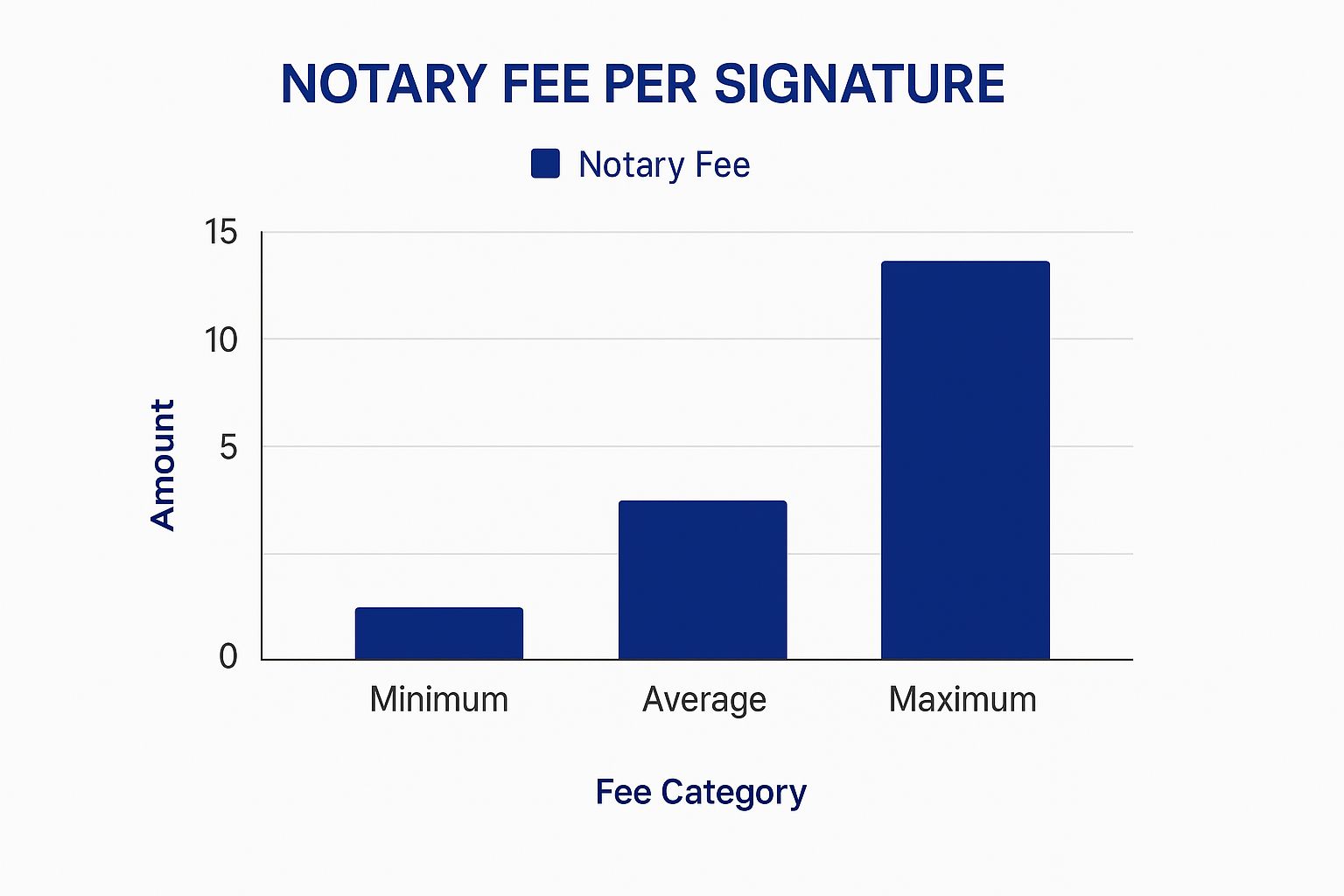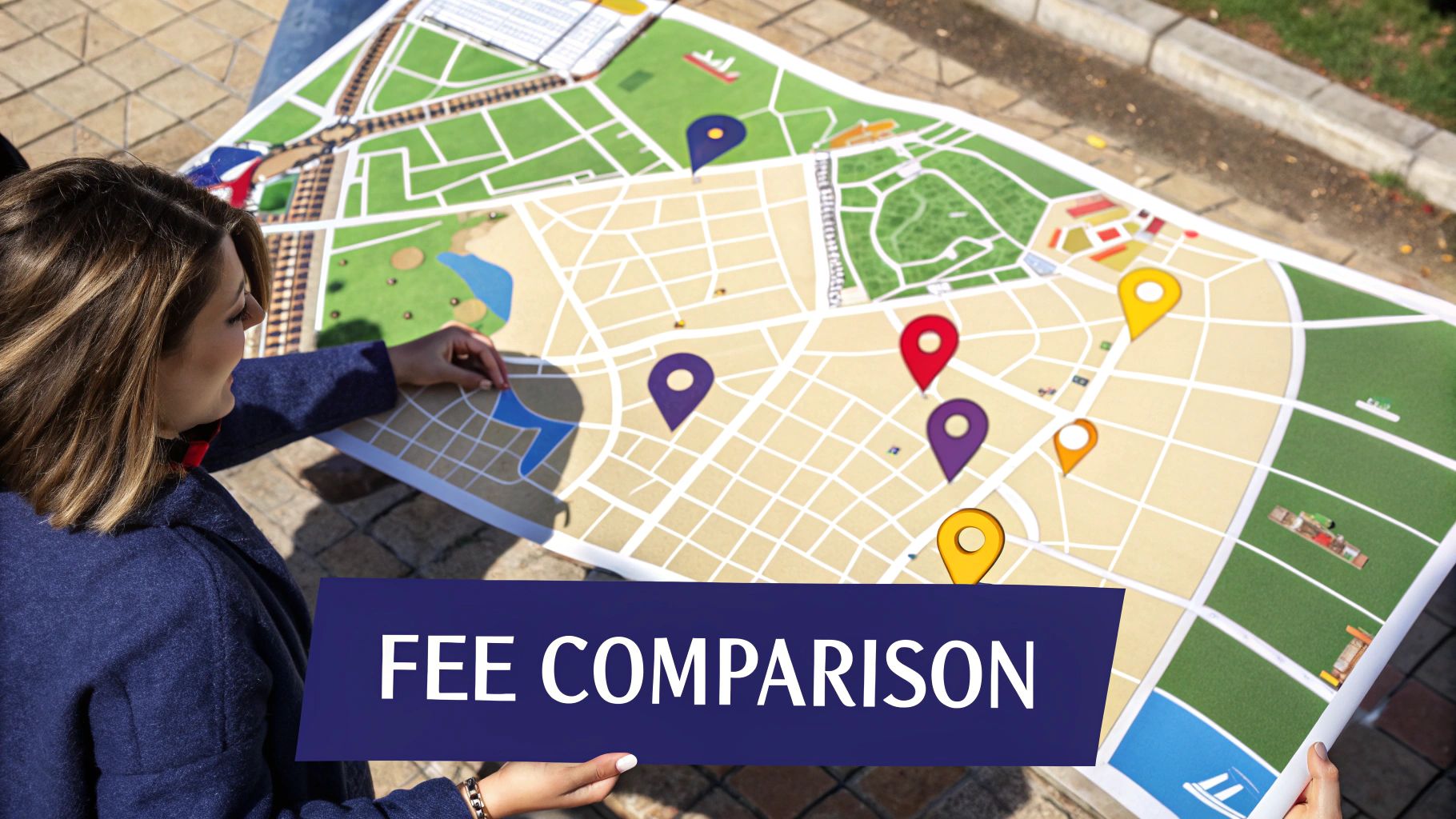The Real Cost of Notarizing a Document Explained
- WebsiteFix Technical Partner
- Jul 13, 2025
- 12 min read
When you need a document notarized, you'll find that the cost can range anywhere from just a few dollars to over $25 per signature. The final price really comes down to your state's laws and the type of service you choose: a traditional walk-in, a mobile notary who comes to you, or an online service.
Your Quick Guide to Notarization Costs
Think of the cost of notarizing a document like buying a cup of coffee. A basic black coffee is cheap, but if you want an espresso drink with oat milk and a shot of caramel, the price goes up. Notarization is much the same. A simple, in-person signature costs one price, but convenience and technology—like having a notary come to your home or using an online platform—will add to the final bill.
The single biggest factor that determines the cost is where you live. In the U.S., each state gets to set its own rules for notary fees, and this creates a huge difference in price from one state line to the next. For example, a notarization in Georgia might only cost you $2, but in California, a notary can charge up to $15 per signature.
Some states, like Alaska and Arkansas, don't set a limit at all, letting the market decide the price. And for Remote Online Notarization (RON), the caps are often higher; states like Florida and Colorado allow fees up to $25 per act. If you're curious about your specific state, the National Notary Association offers a great breakdown of notary fees by state.
Comparing Service Fees: A Visual Breakdown
So, what does this look like in practice? This chart gives you a quick visual on the typical fee range you can expect for a standard notarial act.

As you can see, while the average is pretty low, the maximum fee can be quite a bit higher, which really drives home those state-by-state differences.
To help you decide which option is right for you, let's look at the costs side-by-side.
Typical Notarization Costs At a Glance
This table compares the estimated cost ranges for the three main types of notary services to help you quickly understand your options.
Notary Service Type | Typical Cost Range (Per Signature/Act) | Best For |
|---|---|---|
Walk-In Notary | $2 – $15 | Simple, single-document notarizations when you can travel. |
Mobile Notary | $25 – $75+ (includes travel fee) | Convenience, group signings, or when you are unable to travel. |
Online Notary | $25 – $29 | Speed, security, and notarizing documents from anywhere, 24/7. |
Ultimately, the best choice depends on your budget, how quickly you need the document notarized, and whether you prefer to handle it in person or from the comfort of your own home.
What Really Drives Up Notarization Costs

Ever wonder why one person pays $5 for a quick stamp while another gets a bill for $50 for what looks like the same service? The answer isn't just about the signature. A whole host of factors can inflate the final cost, turning a minor fee into a more noticeable expense.
Knowing what drives these costs is the best way to sidestep any surprise charges. While your state sets the maximum price for the actual notarial act—the signature and seal—notaries are often allowed to charge for other services that go along with it. It’s a lot like ordering at a restaurant: the main course has a set price, but your drinks, sides, and dessert are all billed separately.
These extra charges aren't pulled out of thin air. They fairly compensate the notary for their time, travel expenses, special equipment, or the extra legwork needed to get your notarization done right. Let's dig into what these common add-on fees actually cover.
Travel and Convenience Fees
The biggest and most frequent add-on is the travel fee, which is the main feature of mobile notary services. You're essentially paying for the incredible convenience of having a professional come to you, whether that's at your office, home, or even a hospital bedside.
This fee is completely separate from the state-regulated signature fee and usually isn't capped by law. It covers the notary's real-world costs for:
Time and Mileage: The time it takes to drive to your location and back, not to mention gas and wear and tear on their vehicle.
After-Hours Service: Need a notary on a weekend, late at night, or on a holiday? Expect to pay a premium for that flexibility.
Urgency: If you need a document notarized now, that last-minute or emergency availability often comes at a higher price.
Think of a mobile notary's travel fee like a food delivery surcharge. You aren't just paying for the meal, but for the service of having it brought right to your door. It’s a premium for saving yourself time and hassle.
Technology and Administrative Charges
When it comes to online notarization, technology is front and center—and that tech isn't free. Remote Online Notarization (RON) providers have to manage secure identity verification tools, encrypted video platforms, and tamper-proof digital seals.
These essential security features are typically bundled into a single platform fee. This is why an online notarization might have a flat rate of $25 to $29, even if the state's base fee for a signature is only $10.
You might also run into other administrative fees, such as:
Printing Costs: If a mobile notary has to print out a hefty stack of documents for you, like a full mortgage package, they'll likely charge a per-page fee to cover paper and ink.
Supplying Witnesses: Some documents require witnesses. If you can't provide your own, the notary might charge an extra fee to bring impartial witnesses along.
Wait Time: A notary’s time is valuable. If they show up for an appointment and have to wait around because you or your documents aren't ready, they may charge for that idle time.
Choosing Your Notary Service: In-Person vs. Online

When you need a document notarized, deciding between a traditional, mobile, or online notary isn't just a matter of preference. It's a choice that directly hits your wallet and your schedule. Each service is priced differently, and figuring out the trade-offs is the key to getting exactly what you need without overpaying.
Think of it like getting your groceries. You can drive to the supermarket yourself, which is the cheapest but takes your time. You could pay a little extra for curbside pickup to save a few minutes. Or, you could opt for a premium delivery service that brings everything right to your kitchen counter. The groceries are the same, but the cost and convenience are worlds apart.
The Traditional Walk-In Notary Experience
The classic walk-in service is the most familiar path. You take your document to a notary's office, your local bank, or even a parcel shipping store. You get it signed, sealed, and you're on your way. The main cost is the per-signature fee, which is set by the state and is usually the lowest price you'll find.
But that sticker price doesn't paint the full picture. You have to account for the "hidden" costs—your time, the gas money to get there, and maybe even a parking fee. If you're taking an hour off work or driving across town, this "cheap" option can start to add up quickly.
The Convenience of Mobile Notaries
Don't want to deal with the travel? That’s where mobile notaries come in. They bring the service directly to you, whether that’s your home, office, or a coffee shop. This is a lifesaver for complicated situations like real estate closings or for anyone who has trouble getting around.
The cost structure here is simple: you pay the standard state fee for the signature, plus a separate travel fee. This travel fee is the big variable and isn't usually capped by state law. It’s what compensates the notary for their time on the road, mileage, and being available on your schedule, especially for last-minute or after-hours requests. You’re paying a premium for convenience, but it can save you a world of time and effort. This model is a big reason why the global Mobile Notary Service Market, valued at around $0.4 billion in 2024, is expected to keep growing.
The Speed and Security of Online Notarization
Remote Online Notarization (RON) delivers the ultimate combination of convenience and speed. You can get your documents notarized from literally anywhere you have an internet connection. Instead of juggling different fees, RON platforms typically charge a single flat rate, which often lands somewhere between $25 to $29.
That all-in-one price covers quite a bit:
The actual notarial act.
The technology used for secure identity verification.
A complete audio-visual recording of the signing session.
A tamper-evident digital seal and a secure audit trail for the transaction.
While the upfront $25 for RON might look pricier than a $10 walk-in notarization, it frequently ends up being the more economical choice. Once you subtract the costs of travel, printing, and mailing, and then factor in the sheer amount of time you save, the true value really shines through.
For anyone who puts a high premium on speed, security, and the ability to get things done from anywhere, online services are a game-changer. It's no wonder many experts believe online notarization is the future of document verification. By weighing what matters most to you—cost, time, or convenience—you can confidently pick the service that perfectly fits your needs.
How E-Notary Technology Is Changing the Game
Notarization used to mean one thing: finding a notary, scheduling a meeting, and signing a paper document with wet ink. But that's all changing. Technology is completely reshaping what it means to get something notarized, directly impacting the convenience, security, and yes, even the cost of notarizing a document. This evolution is driven by powerful e-notary software and Remote Online Notarization (RON) platforms.
Think of a RON platform as a high-tech virtual notary office. It has digital security guards that do more than just glance at your driver's license. They use sophisticated tools to verify you are who you say you are, creating a secure and legally sound experience you can complete from your couch.
This isn't just a niche trend; it's a massive economic shift. The e-notary software market, valued at a respectable USD 242.22 million in 2024, is expected to skyrocket to over USD 797.53 million by 2037. Why the boom? Businesses are catching on to the sheer efficiency and security, with some studies showing an incredible 89% reduction in project timelines after switching. If you want to dig into the numbers yourself, you can learn more about the e-notary market’s growth on Research Nester.
The Anatomy of a Secure Online Notarization
So what’s happening behind the screen to make an online notarization secure and legally binding? It’s not just a video call. It’s a multi-layered security process designed to protect both you and your document.
Knowledge-Based Authentication (KBA): This is the first security checkpoint. The system asks you a handful of multiple-choice questions pulled from public records—things like old addresses or cars you've owned. It's a digital secret handshake that only you should be able to complete.
Credential Analysis: Next, you'll snap a picture of your government-issued ID. The platform's software doesn't just look at the photo; it analyzes the ID for holograms, microprinting, and other security features to confirm it's the real deal and not a fake.
Biometric Analysis: Finally, the system often uses facial recognition to compare your live face on the webcam to the picture on your ID. This is a powerful step to ensure the person holding the ID is the person on the ID.
This robust process is exactly why a $25 online notarization can be a far better deal than a $10 in-person one.
When you choose an online notary service, you aren't just paying for a signature. You're paying for a comprehensive security package that includes advanced identity verification, a tamper-evident digital seal on your document, and a secure video recording of the entire transaction. Factor in the savings from no travel, no printing, and no courier fees, and the value becomes crystal clear.
At the end of the day, e-notary technology offers more than just convenience. It delivers a more secure, efficient, and often more affordable way to handle important documents. To see a step-by-step walkthrough, check out our guide on how to get documents notarized online.
Practical Ways to Reduce Your Notarization Costs

Knowing what notarization costs is one thing, but figuring out how to actually lower those costs is where the real savings happen. With a few smart moves, you can take control of what you spend and significantly reduce the cost of notarizing a document. These tips are simple to put into practice and can save you from paying for things you don't need to.
It's a bit like packing your own lunch instead of buying it every day. A little planning goes a long way in keeping more money in your pocket. The same idea works here. If you're proactive and know where to look for deals, you can make an expensive-sounding service surprisingly affordable.
Start with Free and Low-Cost Options
Before you pull out your wallet, it’s always worth checking for free notary services. You might be surprised by where you can find them. This is the easiest way to cut costs, so it should always be your first step.
Check Your Bank or Credit Union: Many financial institutions, like Fifth Third Bank, provide complimentary notary services for their customers. It often depends on the type of account you have, so always call your local branch first to make sure a notary is available and to check if you need an appointment.
Visit Public Libraries: Some public libraries offer notary services to local residents for free or for a very small fee. It's a great community resource that's often overlooked.
AAA and Other Membership Organizations: If you belong to an organization like AAA, take a look at your membership benefits. Notary services are sometimes included as a nice little perk.
Prepare and Plan Your Notarization Session
One of the best ways to avoid extra charges is simply to be organized, especially if you're using a mobile or online notary. Delays, mistakes, and extra trips can get expensive, so a bit of prep work is crucial.
Being prepared for your notarization is like having all your ingredients measured out before you start cooking. It prevents last-minute scrambling and ensures a smooth, efficient process without any costly surprises or wasted time.
A great way to save money is to bundle multiple documents into one session. For instance, if you're hiring a mobile notary for a real estate closing, think about whether you have other documents that need a seal, like a power of attorney. This way, you only pay the travel fee once, which brings down the average cost per document. This is particularly handy for complex legal situations, like those involving property. For more on that, you can review your guide to the quitclaim deed process to see how different legal forms can be related.
Finally, always compare prices. This is especially true for online services. Different Remote Online Notarization (RON) platforms have their own pricing models. A quick search can often uncover a better deal, saving you money for the exact same secure and convenient service.
Common Questions About Notary Costs
When you need to get a document notarized, a few questions about cost always seem to pop up. It’s natural to wonder if you’re getting a fair deal or if there's a better, more affordable way to handle things. Let's walk through some of the most common questions I hear to give you clear, practical answers.
Think of this as your quick-reference guide. We’ll get into the real-world stuff—like bundling documents and figuring out why different notary services have such different prices. My goal is to clear up the confusion around the fees so you can feel confident the next time you need a notary.
Is It Cheaper to Notarize Multiple Documents at Once?
Absolutely. Bundling several documents into one notary appointment is almost always the smartest move, especially if you're using a mobile or online service. While the state-mandated fee for each signature stays the same, you save a ton on the other service charges.
Think about it this way: if you call a mobile notary to your office, they'll charge a travel fee for their time and gas. That fee is for the trip itself, whether you have one document for them to sign or five.
Scenario 1 (One Document): You pay a $10 signature fee + $40 travel fee = $50 total.
Scenario 2 (Three Documents): You pay $30 in signature fees ($10 x 3) + $40 travel fee = $70 total.
In that second scenario, your average cost per document plummeted from $50 to just over $23. You're getting way more bang for your buck by maximizing that one-time travel fee. The same logic holds true for other potential charges, like after-hours or wait-time fees.
Why Is Online Notarization Sometimes More Expensive?
It’s a fair question. Why would a $25 Remote Online Notarization (RON) be a better deal than walking into a local shop that only charges $10? The answer lies in what you're actually paying for. That online fee isn't just for a stamp; it's an all-inclusive price for a pretty sophisticated package of technology and security.
An online notarization platform bundles several critical services together:
Secure Identity Verification: These platforms use advanced tools like Knowledge-Based Authentication (KBA) and credential analysis to confirm you are who you say you are with a very high degree of certainty.
Audiovisual Recording: The entire notary session is recorded and stored securely. This creates a powerful legal record of the entire event, protecting everyone involved.
Tamper-Evident Sealing: Once notarized, your document is digitally sealed to prevent anyone from making unauthorized changes later.
24/7 Availability: This is a huge one. You can connect with a live notary in minutes, no matter the time of day or where you are in the world.
The higher upfront cost of online notarization buys you a comprehensive service bundle that includes top-tier security, speed, and unmatched convenience. When you factor in the money saved on travel, printing, and your own time, RON often proves to be the more economical choice.
Can a Notary Charge Whatever They Want?
No, not for the core notarial act itself. State governments set a maximum fee a notary can charge for each signature or oath. This is a hard ceiling, and notaries are legally barred from going over it. If your state's limit is $15 per signature, they simply can't charge you $20 for that part of the service.
However—and this is a big distinction—notaries are also small business owners. They are legally allowed to charge for other services that support the notarization.
These perfectly legitimate, non-regulated fees can include things like:
Travel and mileage for mobile services
Printing, scanning, or mailing documents
Fees for after-hours or emergency appointments
Wait-time fees if a signer is late or unprepared
Technology platform fees for conducting online notarizations
A truly professional notary will always give you an itemized breakdown of the costs. They’ll separate the state-regulated signature fee from any other service charges. This transparency is key—it ensures you know exactly what you’re paying for and protects you as the consumer.
When you need a reliable and professional service that offers transparent pricing for every option, Signature on Demand has you covered. Whether you prefer the convenience of our mobile notaries or the speed of our secure online platform, we provide clear, upfront costs with no surprises. Get your documents notarized with confidence today.




Comments